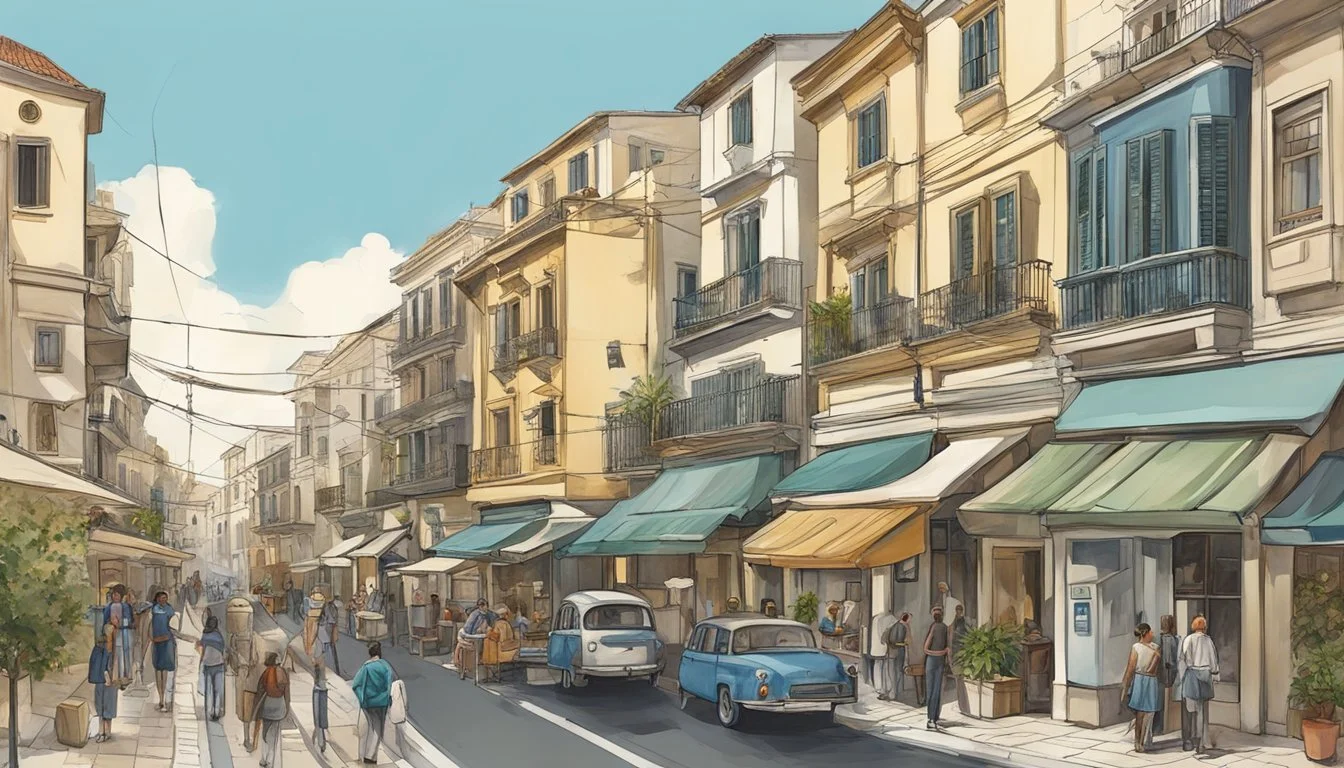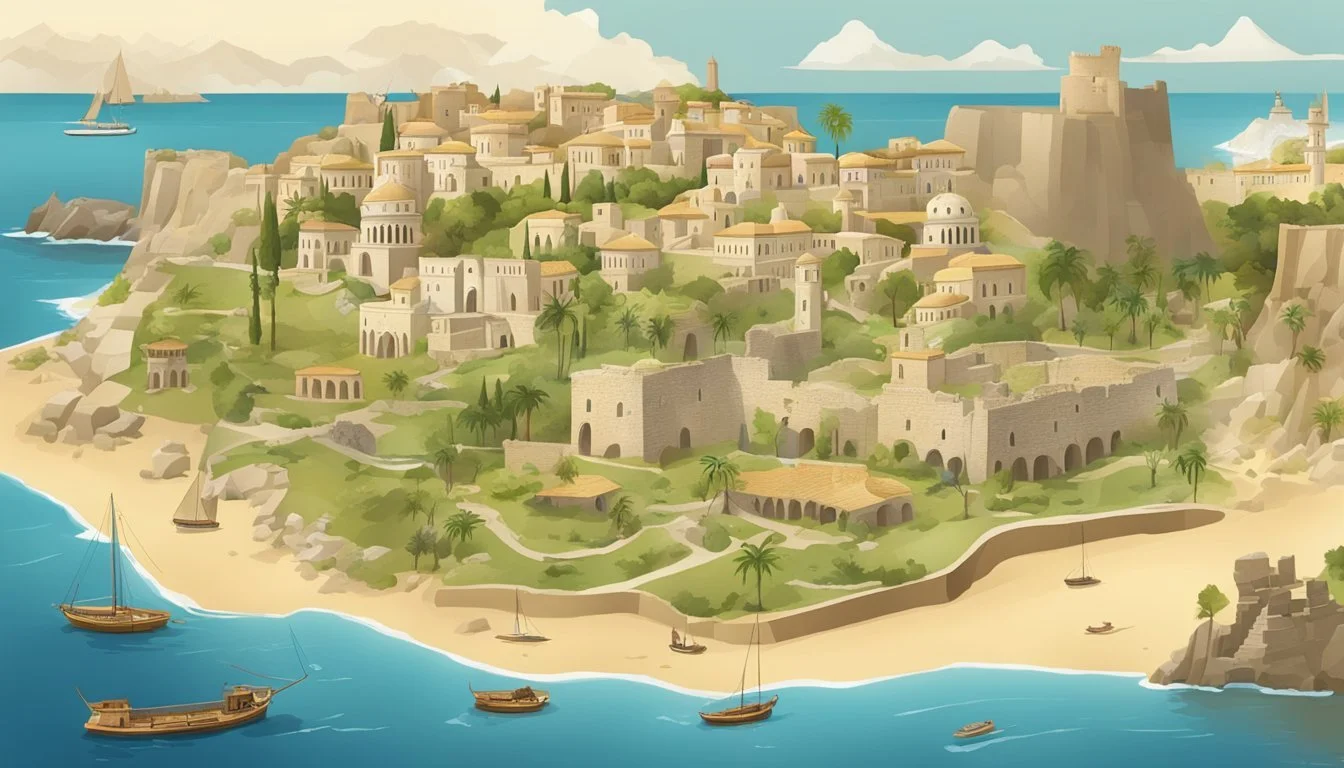7 Compelling Documentaries on Cyprus
Unveiling the Island's Rich History and Culture
Cyprus, an island nation in the Mediterranean, has a rich and complex history that has captivated filmmakers for decades. Documentaries exploring the island's past, present, and future offer viewers unique insights into its culture, politics, and people. These films provide valuable perspectives on Cyprus's division, its ethnic conflicts, and efforts towards reconciliation.
From historical analyses to contemporary portraits, documentaries about Cyprus cover a wide range of topics. They shed light on the island's partition, showcase its natural beauty, and examine the lives of both residents and diaspora communities. Through interviews, archival footage, and expert commentary, these films offer nuanced portrayals of Cyprus's multifaceted story.
1) "Attila 74: The Rape of Cyprus" by Michael Cacoyannis
"Attila 74: The Rape of Cyprus" is a documentary film directed by Michael Cacoyannis in 1975. The film captures the immediate aftermath of the Turkish invasion of Cyprus in July 1974.
Cacoyannis, known for directing "Zorba the Greek," rushed from London to Cyprus upon hearing news of the invasion. He aimed to document the unfolding events and their impact on the island's population.
The documentary features interviews with key political figures involved in the crisis. These include Cyprus President Makarios III and Nikos Sampson, who briefly replaced him during the coup.
Cacoyannis' film focuses on the suffering of Greek Cypriot refugees displaced by the conflict. It showcases the human cost of the invasion, with thousands forced into refugee camps.
The documentary provides a first-hand account of a pivotal moment in Cypriot history. It offers viewers a close look at the political and humanitarian consequences of the 1974 invasion.
2) "Cyprus: The Last Divided Capital" by Abdullah Ocalan
"Cyprus: The Last Divided Capital" examines the complex political situation in Nicosia, Cyprus. The documentary explores the city's division between Greek and Turkish Cypriots since 1974.
Ocalan's film showcases the physical barriers separating the two communities, including the UN buffer zone known as the Green Line. It highlights how this division impacts daily life for Nicosia's residents.
The documentary features interviews with locals from both sides, offering personal perspectives on the ongoing conflict. It also includes historical context about the events leading to the city's partition.
Ocalan's work sheds light on efforts to promote reconciliation between Greek and Turkish Cypriots. The film explores initiatives aimed at fostering dialogue and cooperation across the divide.
"Cyprus: The Last Divided Capital" provides viewers with a nuanced look at one of Europe's longest-standing geopolitical issues. It offers insights into the challenges and hopes for reunification in this unique capital city.
3) "The Island Club: My Cypriot Love Story" by Nadia Rania Zorlukaya
Nadia Rania Zorlukaya's documentary "The Island Club: My Cypriot Love Story" offers a personal glimpse into Cyprus's social scene. The film focuses on the iconic Island Club, a popular nightlife destination in Ayia Napa.
Zorlukaya explores the club's history and its impact on Cypriot youth culture. She interviews long-time patrons, staff, and DJs who have shaped the club's identity over the years.
The documentary captures the vibrant atmosphere of the Island Club through dynamic footage of dance floors and performances. It also examines how the venue has evolved to remain relevant in changing times.
Zorlukaya weaves her own experiences at the club into the narrative, providing a first-hand perspective. She reflects on the friendships and relationships forged within its walls, illustrating the club's role in Cypriot social life.
The film touches on the economic importance of nightlife to Cyprus's tourism industry. It highlights the Island Club's contribution to Ayia Napa's reputation as a party destination.
4) "Cyprus: Digging the Past" by Vassos Karageorghis
"Cyprus: Digging the Past" is a documentary directed by renowned Cypriot archaeologist Vassos Karageorghis. The film explores the rich archaeological heritage of Cyprus, spanning thousands of years of history.
Karageorghis, a respected figure in Cypriot archaeology, guides viewers through significant excavation sites across the island. He shares insights into ancient civilizations that once thrived on Cyprus, including the Mycenaeans, Phoenicians, and Romans.
The documentary highlights key archaeological discoveries that have shaped our understanding of Cypriot history. It examines artifacts, architectural remains, and burial sites that offer glimpses into the island's past.
Karageorghis discusses the challenges and rewards of archaeological work in Cyprus. He emphasizes the importance of preserving cultural heritage and the role of archaeology in uncovering national identity.
The film provides a visual journey through Cyprus's most important historical sites. It showcases the island's diverse cultural influences and its strategic importance in the Mediterranean region throughout history.
5) "Echoes Across the Divide" by Isabel Van Straten
"Echoes Across the Divide" explores the cultural bridging efforts in Cyprus's divided capital, Nicosia. The documentary focuses on a unique musical project that brings together Turkish and Greek Cypriots.
Dutch composer Merlijn Twaalfhoven leads musicians from both communities in creating a performance within the United Nations buffer zone. This area, known as the "Green Line," has long separated the two sides of the city.
The film showcases the challenges and triumphs of collaboration across cultural and political divides. It highlights how music can serve as a powerful tool for fostering understanding and connection.
Participants in the project repurpose items from Nicosia's war debris as musical instruments. This creative approach symbolizes the transformation of conflict into harmony.
Through the eyes of the performers, viewers gain insight into life on an island split by barbed wire and minefields. The documentary captures the complexities of growing up in a divided society.
"Echoes Across the Divide" presents a hopeful vision of unity through artistic expression. It demonstrates the potential for cultural initiatives to succeed where political efforts have stalled.
6) "48 Hours to Victory: Cyprus Peace Operation" by Murat Bayrak
"48 Hours to Victory: Cyprus Peace Operation" offers a detailed look at Turkey's 1974 military intervention in Cyprus. Director Murat Bayrak presents a Turkish perspective on the events that unfolded during this critical period.
The documentary features interviews with Turkish military commanders and soldiers who participated in the operation. These firsthand accounts provide insight into the planning and execution of the military action.
Bayrak's film examines the geopolitical context surrounding the intervention. It explores the tensions between Greek and Turkish Cypriots that led to the crisis, as well as the international response to Turkey's actions.
The documentary uses archival footage and reenactments to illustrate key moments of the operation. These visual elements help viewers understand the scale and complexity of the military campaign.
"48 Hours to Victory" also addresses the aftermath of the intervention and its long-term impact on Cyprus. The film discusses the division of the island and the ongoing efforts to reunify the Greek and Turkish Cypriot communities.
7) "Divided We Dance: Cyprus in Conflict" by Tony Angastiniotis
Tony Angastiniotis' documentary "Divided We Dance: Cyprus in Conflict" explores the cultural divisions on the island of Cyprus through the lens of traditional dance. The film showcases how dance serves as both a unifying force and a reflection of the ongoing political tensions.
Angastiniotis follows dancers from both Greek Cypriot and Turkish Cypriot communities as they prepare for performances. The documentary highlights the similarities and differences in their dance styles, costumes, and music.
Through interviews with dancers, choreographers, and cultural experts, the film delves into the historical roots of Cypriot dance traditions. It examines how these traditions have evolved separately in the north and south of the island since its division in 1974.
The documentary also captures moments of collaboration between Greek and Turkish Cypriot dancers. These joint performances demonstrate the potential for cultural exchange and reconciliation through shared artistic expression.
"Divided We Dance" offers a unique perspective on the Cyprus conflict by focusing on a cultural aspect rarely explored in political discussions. It presents dance as a powerful medium for preserving identity and fostering understanding between communities.
Historical Context of Cyprus Documentaries
Cyprus documentaries explore the island's complex history, cultural heritage, and political divisions. They provide insights into the factors that have shaped modern Cyprus and its ongoing challenges.
Exploration of Cyprus' Cultural Heritage
Cyprus boasts a rich cultural heritage spanning thousands of years. Documentaries often highlight the island's ancient Greek and Roman ruins, Byzantine churches, and Ottoman mosques. These films showcase the diverse influences that have shaped Cypriot identity over millennia.
Archaeological sites like Kourion and Paphos feature prominently, offering glimpses into Cyprus' past civilizations. Filmmakers also focus on traditional Cypriot arts, crafts, and customs that have endured through generations.
Many documentaries examine how this shared cultural heritage has been impacted by the island's division. They explore efforts to preserve historical sites and traditions on both sides of the buffer zone.
Political Influence in Cyprus
Cyprus' political landscape has been heavily influenced by external powers throughout its history. Documentaries often trace the impact of British colonial rule, which lasted from 1878 to 1960.
Films explore the events leading to Cyprus' independence and the subsequent intercommunal conflicts. The Turkish intervention in 1974 and its lasting consequences are frequently examined in depth.
Documentaries analyze the complex negotiations and peace initiatives that have attempted to resolve the Cyprus dispute. They often feature interviews with key political figures and ordinary Cypriots affected by the division.
Recent films have also begun to address the role of the European Union in Cyprus' political future and reunification efforts.
Impact of Documentaries on Cyprus Awareness
Documentaries about Cyprus have played a crucial role in educating global audiences about the island's complex history and ongoing challenges. These films preserve important narratives and bring attention to often overlooked aspects of Cypriot culture and politics.
Raising Global Awareness
Documentaries have significantly increased international understanding of Cyprus. Films like "The Divided Island" explore the historical events leading to the 1963 conflict and subsequent partition, providing context often missing from mainstream media coverage. These works reach audiences far beyond Cyprus, sparking conversations and interest in the island's situation.
Some documentaries focus on specific aspects of Cypriot life, such as the diaspora experience depicted in Kay Pavlou's "Two Homelands". By sharing personal stories, these films create emotional connections with viewers worldwide.
Filmmakers from diverse backgrounds contribute different perspectives, enriching the global dialogue about Cyprus. This variety of voices helps counter simplistic narratives and promotes a more nuanced understanding of the island's complexities.
Preservation of Historical Narratives
Documentaries serve as important tools for preserving Cyprus's historical narratives. They capture first-hand accounts from those who lived through key events, ensuring these stories are not lost to time.
Many films incorporate archival footage and photographs, providing visual context to historical events. This visual documentation helps younger generations and international audiences better grasp the island's past.
Documentaries also highlight lesser-known aspects of Cypriot history, filling gaps in public knowledge. By exploring various time periods and perspectives, these films create a more comprehensive historical record.
The preservation of diverse narratives through documentaries contributes to a richer understanding of Cyprus's cultural heritage. It allows for multiple viewpoints to coexist, fostering dialogue and potentially aiding reconciliation efforts.









